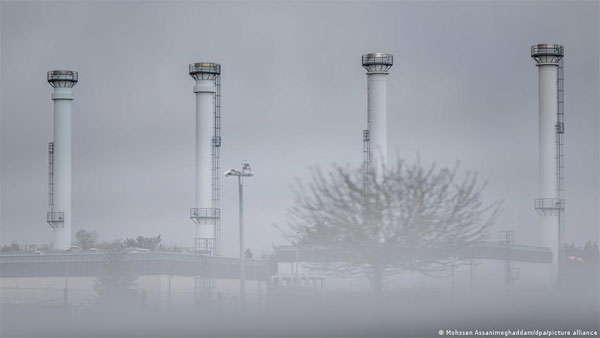
EU energy hopes hinge on a mild winter
Brussels, Sep 27: "If everything goes well, reserves in Germany are high, and if we have a bit of luck with the weather, we have a chance of getting through the winter comfortably," Germany's economy ministerm Robert Habeck, said recently.
The key may lie in the word "if."

The issue of limited energy supply strikes in various guises, the most politically potent perhaps being the threat of energy rationing and cold winter nights. The question many are asking: Can Europe avoid a winter of shortages after Russia has cut supplies of gas?
One way of doing so is building up gas reserves, another cutting consumption. But with prices sky-high and a cost-of-living crisis affecting a growing number of Europeans, the prospects of doing so may ultimately depend on the weather.

"Our scenarios show that failure to ration gas supply sufficiently this winter would mean that European countries would exhaust stocks by February 2023 if winter temperatures are lower than usual," said Krishna Sapkota, senior associate at data analytics firm Enverus Intelligence.
"Yet with 15% demand rationing as targeted by the European Union, Europe will likely be able to survive the full disruption of Russian supply this winter if we see average winter temperatures," he told DW.
Price volatility at a high level
The price for gas to be paid by European consumers almost doubled between June and the start of September. It shot up to a record high after Russia announced in early September that it would stop pumping gas via the Nord Stream 1 pipeline to Germany.
On that Monday, September 5, the benchmark gas price surged as high as €272 ($261) per megawatt-hour (MWh) — 30% higher over the closing on the previous Friday. The Dutch futures gas contract for October, meanwhile, has eased somewhat to around €256, which is still almost 400% higher than a year ago.

This year's price surge has squeezed already struggling European consumers and forced some industries to even cut production. EU residential and commercial gas demand is about 12% lower, with industrial demand down 30% versus the five-year average, or 14% versus 2021.

Experts from US investment bank Goldman Sachs expect European wholesale natural gas prices to fall from the current level of about €215 per MWh to below €100 by the end of the first quarter of next year — but only if Europe sees "typical winter weather conditions," it said in a report, meaning similarly mild temperatures as in previous years.
EU to cut gas addiction
In 2021, the EU imported 155 billion cubic meters (bcm) of natural gas from Russia, about 40% of the total it consumed. The bloc's planned gas replacements by the end of 2022, including liquefied natural gas (LNG), renewables, biomethane, solar rooftops and heat pumps, are about 102 bcm, according to data from the EU Commission's REPowerEU plan.
Currently faced with reduced supply, all EU countries are grappling with lowering their gas demand. At the end of July, the EU agreed on a reduction plan for gas that includes a consumption cut of 15% between August 2022 and March 2023. But lowering consumption enough to ensure stored fuel lasts through the coldest months is a tough call politically and logistically.
In May, Brussels already set a storage target in response to Russian gas cutoffs and the energy crisis, with the aim of reaching at least 80% of full storage capacity by November 1.
According to data from European industry group Gas Infrastructure Europe (GIE), the occupancy rate of underground natural gas storage in EU countries now exceeds 85%, or 90 bcm. The maximum capacity is around 108 bcm, the group representing gas infrastructure operators says on its website.

How long will it last?
In a normal year, 85% would cover Europe's winter peak in gas use. Full gas storage could sustain European countries for at best about three months, according to the Oxford, UK-based Aurora Energy Research think tank.
However, predictions as to how long Europe's gas reserves will last vary. This is due to different temperature expectations and the availability of other sources of energy, for example, nuclear power in France and the possibility of Russia resuming some supplies via Nordstream 1.
Goldman Sachs expects storage facilities to remain at least 20% full by the end of March 2023, while energy research and consultancy firm Wood Mackenzie says an unusually cold winter in the Northern Hemisphere could reduce European gas inventories to 4% of total capacity by March.
Meanwhile, not all EU countries have underground storage. Of those that do, 10 of the 27 have surpassed the 80% target by September: Belgium, the Czech Republic, Denmark, France, Germany, Italy, Poland, Portugal, Spain and Sweden.

France and Germany are key
Germany is home to nearly a quarter of the EU's storage capacity, with the gas stored there expected to meet 80 to 90 days of average demand. In 2021, Europe's biggest economy relied on Russia for around 55% of its annual gas supplies.
After Russia's invasion of Ukraine, the government of German Chancellor Olaf Scholz introduced a requirement for storage to be 75% full by September 1 and raised the targets for October and November to 85% and 95%, respectively, from 80% and 90%.
Surging gas prices have even forced Berlin to put together a rescue package for gas importer Uniper, which has had to buy gas at far higher prices on the market to fulfill its supply contracts. Now, Berlin is acquiring a 98.5% stake in the gas importer, as Russia's gas supply freeze threatens to drive the company into bankruptcy.

During a visit of Chancellor Scholz to several Gulf states and Saudi Arabia last weekend, German utility RWE signed a deal with Abu Dhabi National Oil Company (ADNOC) for the delivery of LNG by the end of December.
The deal, which includes a memorandum of understanding for multiyear supplies, will begin with a relatively small amount of 137,000 cubic metres of LNG, but it will be the first shipment via Germany's newly built floating gas import terminal at Brunsbüttel near Hamburg.
Germany is in a rush to build two new LNG terminals to eventually receive up to 12.5 bcm a year, equivalent to about 13% of the country's gas consumption in 2021, according to data from research firm Enerdata.
Scholz has said recently Germany is "well-placed to get through the winter with enough energy," — weather permitting of course.
France is also working on contingency plans. French electricity operator RTE and gas network operator GRTgaz have both said reduced energy consumption during the winter will become necessary, but that this will largely depend on whether temperatures are "average, cold or very cold."
The fall, however, is likely to pose as many risks as the winter, warned the president of RTE's managing board, Xavier Piechaczyk.
Compared with the 43 terawatt-hours (TWh) of electricity France generated in previous years on average, Piechaczyk said output is expected to fall to 33 TWh this year, due to lower supply of hydroelectric power and the limited availability of French nuclear reactors.
In the most likely scenario, about 75% of France's nuclear capacity is expected to be available in January, meaning a significant amount of electricity will have to be imported.
In the case of a "very cold" winter, GRTgaz said it expects a shortfall in gas supply of around 5%, a level it said that "can be absorbed by reaching the energy-saving objectives set by the authorities."
Current weather forecasts for Europe indicate milder and drier weather than usual when the heating season in Europe starts next week — but the best-laid plans of mice and men and all that.
Source: DW


 Click it and Unblock the Notifications
Click it and Unblock the Notifications

































